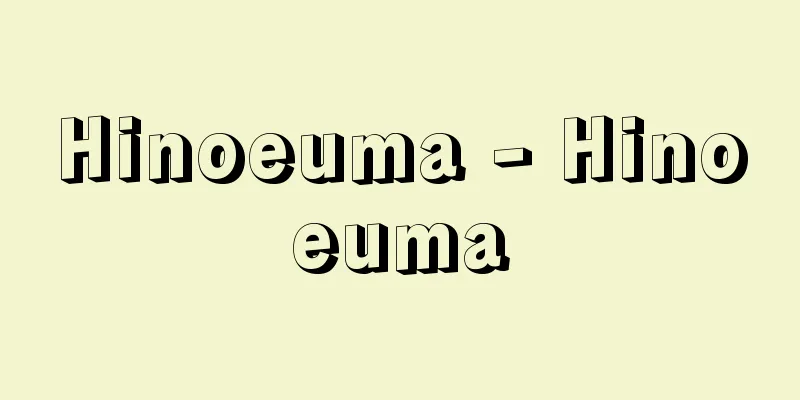World History

|
A history of all humanity that incorporates every ethnic group, nation, society, and culture on earth. However, no such history has actually been written. Usually, world history is a collection of national histories, or a broad-area history that expands upon regional histories such as Western history and Eastern history, but this is a convenient term; in its true meaning, it is a history written in a unified manner that encompasses many countries and regions based on a certain concept of the "world." The descriptions vary depending on that concept. In fact, some histories have been histories of Roman rule, or the history of the establishment of European culture. However, in reality, the subjective concept of the world is moving in the direction of coinciding with the objective world. A true world history will be written in the future. Even if world history is not actually written, it may exist in the consciousness of the historian as a holistic view that arranges and gives meaning to individual facts when he writes about them. There is no historian who does not have some view of world history. In any case, world history is related to a comprehensive view of history, so it is a subject of philosophy of history before it is a subject of historiography. [Kamiyama Shiro] Ideas of World HistoryIn the West, the last Greek Polybius was the first to write The History of the World, 40 books (only the first five remain), in the 2nd century BC. He wrote history not from a rhetorical point of view, but as a description of political and national affairs, and saw it from a broad perspective. In reality, it was nothing more than the process by which the mighty power of Rome rose to become a Mediterranean world power. Although his perspective went beyond the polis-centrism of the Greeks, it was no more than the history of Roman hegemony. Polybius also saw history as the rise and fall of nations, and held the theory of cycles that it was a repetition of changes in the three forms of government: "monarchy, aristocracy, and democracy." In the 5th century, Augustine wrote the 22 volumes of The City of God while observing the Roman Empire on the brink of collapse due to the invasion of the Germanic peoples. In the latter half of this book, he explains the long history from the expulsion of Adam and Eve from Paradise to the birth of Christ and the completion of human salvation through the Atonement. This is the inner meaning of world history that is consistent as the history of humanity. The idea of the unity of humanity, the meaning of history as the history of salvation, and the ultimate purpose of all history are based on Christian faith. The idea that history is created by humans of their free will under God's providence and that it progresses over time with the aim of reaching a final goal became the traditional view of history in Europe. In modern times, this idea became secularized and transformed in various ways. One example is Kant's philosophy of history, which holds that world history is the process of realizing the "perfect possibility" that humans are born with. In the 14th century, the Islamic historian Ibn Khaldun wrote the Book of Ibal, a history of the vast Islamic cultural sphere in North Africa. It is said to be a world history, but in the introduction, "Muqaddimah," he did not write genealogies or chronicles of dynasties, but instead showed the historical pattern that the desert tribes uniformly followed: "nomadicism, settlement, dynasty, downfall." This was a kind of cyclical view of history, and his method could be said to be a pioneer of the view of civilization history that compares the forms of multiple civilizations under a single pattern. During the Italian Renaissance in the 15th and 16th centuries, humanists had a historical consciousness that after the fall of the glorious Rome, we entered a dark age and are now entering an age of "rebirth." For this reason, they viewed all history in a diagram of "life, death, rebirth," which gave rise to the division of eras into "Ancient, Middle Ages, and Modern." Since the German historian Cellarius wrote "The History of the World" using this three-division method in the 17th century, this has become the European style of narrating world history. However, this view of history is a discontinuous theory that does not recognize the natural progression of history, and it is a unique view that denies the Middle Ages in between and sees ancient and modern times as directly connected. It became the basis of the Renaissance and Enlightenment view of history, but it has now been overturned by medieval studies. The Enlightenment thinkers of the 18th century broke with tradition, preached the omnipotence of reason, and learned of the world outside Europe through geographical discoveries. Voltaire, in opposition to Bishop Bossuet's Treatise on World History, which preached the centrifugal expansion of Christian Europe, wrote Essays on the Manners and Spirit of Peoples, treating Asian nations and religions equally. This was the first cultural history of the world, but because the Enlightenment viewed everything in the "light of reason," it viewed history solely as rational progress, concluded that the past was uncivilized, and believed that modern Europe was the pinnacle of that progress, which was still Eurocentric. Germany's modernization was delayed by the devastation of the Thirty Years' War, and so there was no foundation for accepting Enlightenment ideas, and thinkers instead sympathized with the anti-Enlightenment Romanticism. The romantic philosopher Herder valued the individuality of each era and each nation over historical progress, and saw world history as the organic whole of various nations. This view of ethnic history became the dominant view of history in modern times. However, this is also Enlightenment, as it claims that while each nation shows its own individuality, they also aim to express a common universal "humanity" (i.e., rationalize). [Kamiyama Shiro] Eurocentric World HistoryRanke, the historian who established modern historiography in the 19th century, also based his theory on romantic individualism and regarded nations as the basis of history, but he did not regard world history as a collection of ethnic histories. Seeing world history as a spiritual whole that relates to individual histories in addition to individual histories is somewhat philosophical. Specifically, it is the community that the Roman and Germanic nations created in Europe with Christianity at its core. This is the world history conception of 19th century German historians. Ranke wrote many national histories based on this conception, and also wrote "World History" (unfinished up to the middle of the 15th century) in his later years. Ranke's view of world history is a single track that follows a path from the ancient Orient to Greece and Rome, through the Christian Middle Ages, and on to the formation of modern Roman and Germanic states. This coincides, strangely enough, with the vision of the philosopher Hegel. In his Lectures on the Philosophy of History, Hegel viewed world history as the self-realization of the world spirit. In reality, this manifests itself as the progress of the consciousness of freedom, and he saw it as a development from ancient despotic kingdoms with a single free king to modern nation-states in which all citizens are free. Although Hegel did not adopt a teleological view that world history would be completed with Christian Germanic nations, this Eurocentric, nationalistic view of world history was a concept that Europeans in the 19th century held primarily, and was backed up by the reality of the world domination of the great European powers. Marx, who emerged from Hegel's school after his death, reversed idealism and advocated materialism, but he learned a lot about history from Hegel. He saw history in terms of the development of production modes, but his four-stage view of the basic course of world history, "Asiatic, Ancient Greek and Roman, Medieval feudal, and modern bourgeois," is the same as that of Ranke and Hegel. Also, the idea of futurism, which holds that the abolition of private ownership of the means of production will bring an end to the history of class struggle and usher in a happy society for all mankind, is classical in form. [Kamiyama Shiro] Global World HistoryIn the 20th century, after World War I, non-European powers rose as European powers declined, opening up an objective view of world history. Spengler's "The Decline of the West" overturned Eurocentrism by showing that the European civilization that once dominated the world was merely one of many civilizations, and that its lifeline was now running out. The view of civilization history that places the basis of history in a broader civilization than nations or societies and repeats a pattern of "emergence, growth, and extinction" was inherited by A. J. Toynbee, who instead of the previous monistic, chronological, and teleological view of world history, advocated the emergence of multiple civilizations and the simultaneous comparison of their forms. World history is not a straight line from the prehistory of the Orient to modern Europe, nor is it the diffusion of European civilization, but rather the simultaneous emergence of multiple civilizations. This view of world history paves the way for a global world history to be written, taking into account the reality that the world's leadership has now shifted from Europe to the United States and the former Soviet Union, and is becoming more multipolar, with different systems coexisting and multiple civilizations with multiple values coexisting. [Kamiyama Shiro] "Challenges of World History" by J. Vogt, translated by K. Konishi (1956, Keiso Shobo) Source: Shogakukan Encyclopedia Nipponica About Encyclopedia Nipponica Information | Legend |
|
地上のあらゆる民族、国家、社会、文化を取り込んだ人類全体の歴史。しかし実際にそういう歴史が書かれたことはない。普通、各国史を集めた万国史や西洋史、東洋史という地域史を広げた広域史を世界史というが、それは便法で、真の意味は、「世界」についての一定の観念が多国多地域を包括して統一的に書いた歴史のことである。その観念によって記述は一様ではない。事実上はローマ支配史であったり、ヨーロッパ文化成立史であったりした。しかし現実は、世界についての主体的観念が客体の世界と一致する方向に進んでいる。真の世界史はこれから書かれるだろう。 また世界史は、実際に書かれなくても、歴史家が個々の事実を書くとき、それを配置し意味づける全体観として歴史家の意識のなかにあるだけのこともある。なんの世界史観ももたぬ歴史家はいない。いずれにせよ世界史は総合的な歴史観にかかわるので、歴史学の対象以前に歴史哲学の対象である。 [神山四郎] 世界史の諸観念西洋では紀元前2世紀に最後のギリシア人ポリビオスが最初に『世界史』40巻(初めの五巻のみ残存)を書いた。彼は歴史を修辞的興味からではなく政治・国事の記述として書き、それを広い視野でみた。それは現実には、ローマの強大な勢力が地中海世界国家にのし上がってゆく過程にほかならなかった。その見地はギリシア人のポリス中心主義を超えてはいるが、ローマ覇権史以上のものではない。またポリビオスは歴史を諸国家の興亡とみて、それは「王政、貴族政、民主政」の三政体の変動の繰り返しであるという循環論ももっていた。 5世紀にアウグスティヌスは、ゲルマン人の侵入によって瀕死(ひんし)のローマ帝国をみながら『神の国』22巻を書いた。この書の後半で彼は、人祖アダムとイブの楽園追放から、キリストの降誕、贖罪(しょくざい)によって人類の救いが完成するまでの長い歴史を説いている。それは人類史として一貫した世界史の内面的意味である。人類の一体観、歴史の救済史的意味、全歴史の終局目的についての観念はキリスト教信仰に基づくものである。歴史は神の摂理のもとに人間が自由意志でつくり、最終ゴールを目ざして時間的な発展を遂げるものという観念は、ヨーロッパの伝統的な歴史観になった。近代になるとその観念はさまざまに世俗化し変容する。世界史は人類が先天的にもっている「完全可能性」を実現する過程だというカントの歴史哲学などはその一例である。 14世紀にイスラムの歴史家イブン・ハルドゥーンは北アフリカの広大なイスラム文化圏の歴史『イバルの書』を書いた。それは世界史といわれるが、その序説「ムカッディマ」で彼は、王朝の系譜や年代記を書くのではなく、砂漠の諸部族が一様にたどる「遊牧、定住、王朝、滅亡」という歴史のパターンを示した。これは一種の循環史観で、その方法は一つのパターンのもとに多文明の形態を比較する文明史観の先駆けといえる。 15、6世紀イタリア・ルネサンス期に人文主義者は、あの栄光のローマが滅んだあと暗黒時代に入って、いま「新生」の時代を迎えているという歴史意識をもっていた。そのため全歴史を「生、死、再生」いう図式でとらえ、それが「古代、中世、近代」という時代区分を生んだ。17世紀にドイツの歴史家ケラリウスがこの三分法によって『世界史』を書いて以来、これが世界史叙述のヨーロッパ的スタイルになった。しかしこの歴史観は、歴史の自然的推移を認めない非連続説で、中間の中世を否定して、古代と近代が直結するという独特の見方で、ルネサンス・啓蒙(けいもう)史観のもとになったが、いまでは中世研究によって破られている。 18世紀の啓蒙思想家は伝統を断ち切って理性万能を唱え、地理的発見によってヨーロッパ外の世界を知った。ボルテールは、キリスト教的ヨーロッパの遠心的拡大を説くボシュエ司教の『世界史論』に反対して、アジアの諸民族・諸宗教も同等に扱い『諸国民の習俗と精神のエッセイ』を書いた。これは最初の文化史的世界史であるが、啓蒙思想はすべてを「理性の光」でみるため、歴史をひたすら合理的進歩としてとらえ、過去はすべて未開であるときめつけ、現代のヨーロッパがその進歩の頂点であるという意識は、やはりヨーロッパ中心的である。 ドイツは三十年戦争の荒廃によって近代化が遅れたため、啓蒙思想を受け入れる地盤がなく、思想家はむしろ反啓蒙のロマン主義に共鳴した。ロマン的な哲学者ヘルダーは、歴史の進歩より各時代・各民族の個性を重んじ、諸民族の有機的全体を世界史とみた。この民族史観は近代の有力な歴史観となった。しかし諸民族はそれぞれ個性を発揮しながらも、共通の普遍的「人間性」の発現(つまり理性化)を目ざしているというので、これもやはり啓蒙的である。 [神山四郎] ヨーロッパ中心世界史19世紀に入って、近代史学を確立した歴史家ランケは、やはりロマン的個体主義によって民族を歴史の基体としたが、民族史の寄せ集めを世界史とはしなかった。個別史のほかに関連する精神的総体を世界史とみたところは、いくぶん哲学的である。それは具体的には、ローマ的・ゲルマン的諸民族がヨーロッパにキリスト教中心につくった共同体である。これは19世紀ドイツの歴史家の世界史の構想である。ランケはこの構想のもとに数多くの各国史を書いたが、晩年『世界史』(15世紀なかばまでで未完)も書いた。 ランケの世界史は、古代オリエントからギリシア、ローマに進み、キリスト教的中世を経て、近代のローマ的・ゲルマン的諸国家の形成に至る単線コースである。これは、奇(く)しくも哲学者ヘーゲルの構想と一致している。 ヘーゲルはその『歴史哲学講義』において世界史を世界精神の自己実現とみた。それは現実には自由の意識の進歩となって現れるから、王1人が自由の古代専制王国から、国民すべてが自由になる近代国民国家に至るまでの発展とみた。ヘーゲルのようにキリスト教的ゲルマン国家で世界史が完成するという目的論をいわないまでも、こうしたヨーロッパ中心のナショナリズムの世界史観は、19世紀のヨーロッパ人が主体的にもっていた観念で、現実のヨーロッパ列強の世界支配がそれを裏づけていた。 ヘーゲルの死後その学派から出たマルクスは、観念論を逆転して唯物論を唱えたが、歴史観は多くのものをヘーゲルから学んだ。彼は生産様式の発展で歴史をみたが、世界史の基本的コースを「アジア的、古代ギリシア・ローマ的、中世封建的、近代ブルジョア的」という四段階としていることは、ランケやヘーゲルの図式と同じである。また生産手段の私有を撤廃することによって、これまでの階級闘争の歴史を終わらせ、人類の幸福な社会が到来するという未来主義の理念も形は古典的である。 [神山四郎] グローバル世界史20世紀に入り第一次世界大戦後、ヨーロッパ勢力の衰退につれて非ヨーロッパ勢力があがり、客体的な世界史への展望が開けた。シュペングラーの『西洋の没落』は、かつて世界を支配したヨーロッパ文明も多文明の一つにすぎず、いまその命脈が尽きようとしているという歴史観によって、ヨーロッパ中心主義を打ち破った。 歴史の基体を国家や社会よりもっと広い文明に置いて、それが「発生、成長、死滅」のパターンを繰り返すという文明史観は、A・J・トインビーに受け継がれて、それまでの一元的、年代的、目的論的な世界史観のかわりに、多元的文明の発生とその同時的な形態比較を主張した。世界史は、オリエントの前史から近代ヨーロッパまでの直線コースではなく、ヨーロッパ文明の拡散でもなく、多文明の多発並行であるというこの世界史観は、いま世界の主導力がヨーロッパからアメリカ、旧ソ連に移り、さらに多極化し、異体制の共存と多価値観をもつ多元的文明が併存している現実を対象に、グローバルな世界史が書かれるための一つの道を開いている。 [神山四郎] 『J・フォークト著、小西嘉四郎訳『世界史の課題』(1956・勁草書房)』 出典 小学館 日本大百科全書(ニッポニカ)日本大百科全書(ニッポニカ)について 情報 | 凡例 |
<<: Universal Time - Sekaiji (English)
>>: World Code - Sekai Koumoku
Recommend
viola da Moor (English spelling) violadaMoor
...The name "viola d'amore" (viol o...
International Charter of Physical Education and Sport
An international declaration on physical education...
Iaido - Iaido
The moment the sword is drawn from its sheath, the...
Mortar - Mortar (English spelling)
A building material. A mixture of cement, sand, a...
Three-dimensional coordinate measuring machine (English: three coordinate measuring machine)
A three-dimensional coordinate measuring instrumen...
Perm
…It is also called Ziryene. It belongs to the Fin...
Taisho shrimp (Penaeus chinensis)
A large shrimp of the family Penaeidae, which is p...
Postal pension - Yubinnenkin
A government-run voluntary personal pension insur...
Samivel
…Then André Herre and Eddy Legrand, who used hand...
Hemoglobinopathy - Hemoglobinopathy
[What kind of disease is it?] There is a genetic p...
index number
…A manifold has an index as a topological invaria...
Song of the Defenders - Sakimoriuta
The term refers to poems written by the defenders...
Provocation (English spelling)
During the ancient Roman Republic, citizens had th...
Kashima [town] - Kashima
A town in Kamimashiki County, central Kumamoto Pre...
Watertight compartment
A watertight compartment separated by vertical an...









